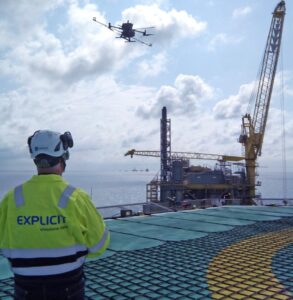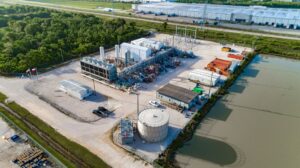BP and Baker Hughes make headway in monitoring methane emissions from flaring
U.S. energy technology player Baker Hughes has joined forces with BP, a UK-headquartered energy giant, to bring a new application for the upstream oil and gas sector to life as part of its emissions abatement technology offering. As a result, the oil major can quantify and curb methane slip emissions from its flaring operations.

As there is no universally accepted solution to quantifying methane emissions from flares, the duo claims that it has carried out one of “the largest ever full-scale studies” of flare combustion, including testing a range of flares under challenging conditions and verifying the accuracy of Baker Hughes’ flare.IQ technology.
The U.S. giant highlights that BP has achieved a breakthrough in flare emissions monitoring by acting on real-time data from flare.IQ at 65 flares across seven regions. As a result, the UK energy player can undertake early interventions to reduce emissions from flaring.
Fawaz Bitar, BP’s Senior Vice President of Health Safety Environment & Carbon, commented: “BP’s transformation is underway, turning strategy into action through delivery of our targets and aims. We don’t have all the answers, and we certainly can’t do this on our own.
“Through our long-standing partnership with Baker Hughes, we have progressed technology and implemented methane quantification for oil and gas flares, helping us to achieve the first milestone of our Aim 4. We continue to look at opportunities like this, where we can collaborate across the industry to find solutions to our biggest challenges.”
According to Baker Hughes, flare.IQ, which is part of its Panametrics product line portfolio, builds on four decades of ultrasonic flare metering technology experience while its advanced analytics platform enables operators to pull information from their flare systems, such as temperature, pressure, vent gas velocities, and gas composition, to help maximize combustion efficiency and minimize emissions.
Ganesh Ramaswamy, Executive Vice President of Industrial & Energy Technology at Baker Hughes, underlined: “Our collaboration with BP is an important landmark and a further illustration that technology is a key enabler for addressing the energy trilemma of security, sustainability and affordability.
“As a leader in developing climate technology solutions, such as our flare.IQ emissions monitoring and abatement technology, cooperations like the one we have with BP are key to testing and validating in the field solutions that can enable operators to achieve emissions reduction goals efficiently and economically.”
As part of its energy transition drive and strategy related to new energies, Baker Hughes took several steps to advance its hydrogen-enabling technologies and execute multiple customers’ hydrogen projects and new collaborations.
Recently, the U.S. firm won a contract with Petrobras for integrated well construction services for a large deepwater field in Brazil’s pre-salt Santos Basin.









